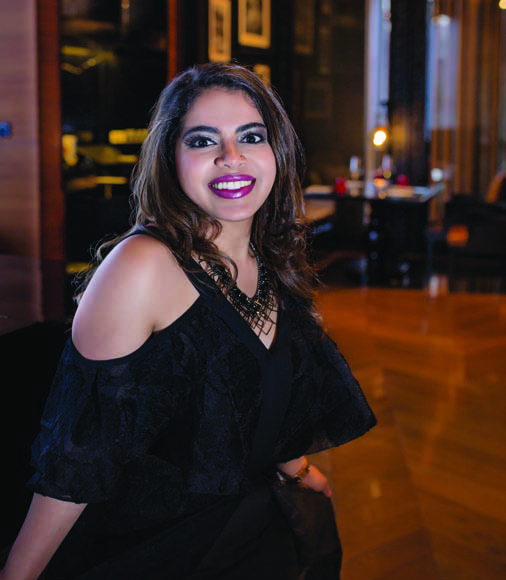Milan R. Khemlani’s career path shows us what can happen when we step outside our comfort zone.
By Christy Lau
It’s no secret that we all love indulging in some much-needed retail therapy from time to time, often just to help ease the tension from a busy week. Stores are especially tempting when they fl ash their best at us through gleaming windows, while mannequins project ideal versions of ourselves. Behind the scenes are merchandisers, who work tirelessly to choose the best pieces to ensure that brands are meeting their expected sales goals.
One of these curators is Central Group’s Senior Merchandiser and Acting Product Manager, Milan R. Khemlani. Born and bred in Bangkok, Milan fell into the industry quite by accident, as her pursuits never included a career at a fashion conglomerate. However, she seized the opportunity when she was presented with an unexpected job off er, which led her down a fruitful path. Now, after completing fi ve years at Central, she has gone from handling high-street brands like Burton, Topshop and Miss Selfridge, to managing luxury labels such as Ralph Lauren, Calvin Klein and Versace, while working collaboratively with the UK, US and Italy head offices. Her role requires a keen understanding of both the Thai market and global trends in order to assemble a brand’s seasonal collection. And that’s not all for this ardent go-getter, as she is also in the beginning stages of launching her own footwear line, focusing on designing fashionable and functional shoes for both men and women.
Milan gets candid about her whirlwind entrance into the fashion industry, and what led her to pursuing her dreams by creating her own footwear prototype.
What sparked your interest in fashion?
I was never deeply interested in fashion, but I knew I didn’t want to study STEM subjects, so I went for art instead. When I was in the process of applying to LASALLE College of the Arts in Singapore, I got an off er from Raffles International College Bangkok to study fashion design, which I took. I was never someone who liked drawing, but I always wanted to know what was behind the glitz and glam of the industry. While studying fashion marketing and management, I also worked with my dad, who does a lot of importing and exporting of garments.
How did your education influence your decision to work in the fashion industry?
My first course was fashion management, which made me want to pursue fashion further, because I desired to know why brands chose certain symbols and motifs. When I graduated from Raffles International College Bangkok at 19, my parents pushed me to study more, so I went ahead and enrolled at London College of Fashion for three years, completing a double major in fashion entrepreneurship and footwear designing. While there, I did my thesis project on footwear design, which meant that I had to create a pair of convertible heels. Many people told me that I wouldn’t be able to pass the proposal stage, but I did, and I even ended up patenting the shoes, because I thought I might launch them in the future.
What inspired you to create these heels?
They are a combination of comfort and technology. Girls always carry around flats and heels when they club in London, so I thought, why not turn your fashionable heels into flats? Although removable heels are already available, what I created doesn’t have to be taken apart.
Why did you decide to work for Central after you graduated from London College of Fashion?
After graduation, I came back to Bangkok for summer break. Two weeks before I was supposed to return, one of my sister’s friends, who was working for Central, contacted me and said they were looking for someone with a background in fashion. I decided to go despite not knowing much about the company or position. The interview took four hours and they ended up offering me a job as a merchandiser. I was hesitant at first, but it felt like the universe had put this in my path for a reason, so I accepted! I also wanted to learn more about launching a brand in Thailand, as I had plans to set up my own label here.
What were some initial challenges and how did you overcome them?
It was definitely the mindset of Thai people and their work ethic. Coming from an international background, I found the work environment quite traditional and strict. I had to change my own mindset a little to fit in. Gradually, the company became more diverse with the arrival of many expats. Today, I am surrounded by a group of very open-minded people.
What do you love most about your job?
Discounts? (she laughs) Jokes aside, I enjoy gaining new knowledge and I’m always keen to speak to the international teams, because that’s how I find out what’s happening in other markets. My team is fantastic and I consider them family, so that actually pushes me to work harder. Of course, the greatest satisfaction for me is when people love the collections I pick out.
What would surprise people about the role of a senior merchandiser?
Beyond choosing the right products for the right stores and the right market, you have to also keep informed about what your competitors are doing, and be adept in calculating season sales forecasts, as well as analysing sales reports.
You’re a pro at understanding different consumer markets. What are some key differences between the Thai and UK markets?
Thai people are quite conservative. They are open to new trends, but the majority of them will wait for a fad to reach its peak stage. They are not risk-takers and will be quite cautious to show certain parts of their bodies. As a major fashion capital, London is where people are more experimental. Given its beautiful historical culture, fashion tends to be quite quirky and vintage with a dash of minimalism. I would say London has got that unconventional, let-your-freak-flag-fly vibe.
In your opinion, what are some of the trends that will most likely be popular next year?
Animal prints, sequins and party dresses are huge right now. The next big thing will be checks, mix and match prints and unstructured garments.
What does a typical week look like for you?
It’s filled with numerous meetings with other marketing teams, working on e-commerce promotions, keeping my international partners up-to-date, and surprise store visits to check for operation issues.
With such a busy schedule, how do you balance your work and personal life? What time management tips can you offer?
With my hectic 12-hour workweek, I make sure to have ‘me’ time. I do reiki and meditation, and during the weekends, I sometimes take trips outside the city just to rejuvenate myself. As for tips, I’ll say learn how to say no. The more you say yes, the more you are going to be called everywhere, and feel drained. Secondly, set your goals and try to prioritise. If you’re unable to, you won’t be able to complete any task. Finally, set aside time for yourself, even if it’s just one hour, so you can recharge and be ready to face any demanding task head on.
What drives you?
Competing with myself. You need to have that fire burning inside to keep on striving. I set a goal for myself on every birthday and then I make sure I achieve it. I want to keep my parents proud, but most of all, I want to be proud of myself.
What does the future hold for you?
I’m currently working on another patented footwear product with my London team. Then I plan to launch my own footwear brand in about two years in either Hong Kong or London, before bringing it to Thailand. After that, my long-term goal is to build a fashion school for the less fortunate.
Do you have any advice for other aspiring fashion entrepreneurs?
Follow your heart, make sure you understand exactly what you want, go to a reputable fashion school, make sure you know your textiles well, and finally, make sure you love it.







